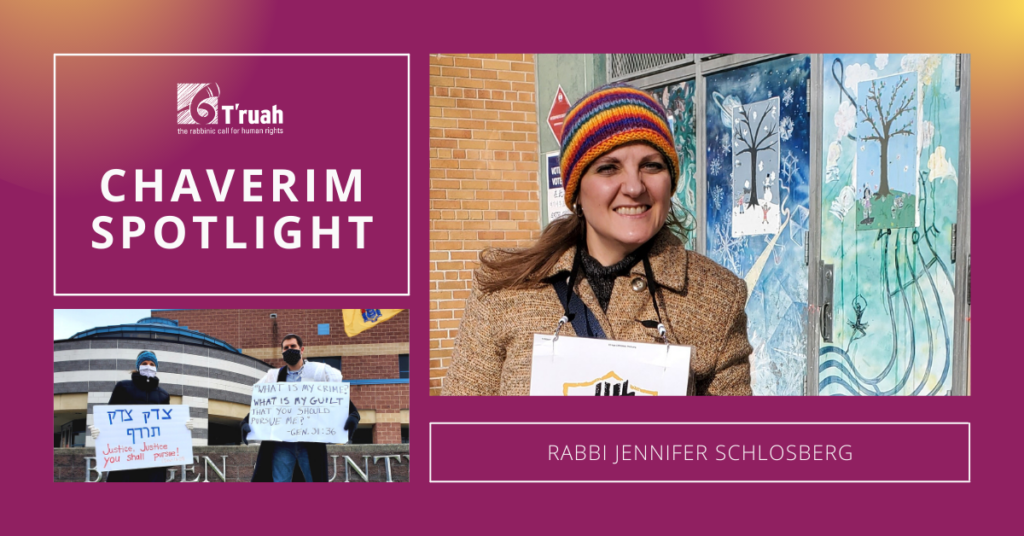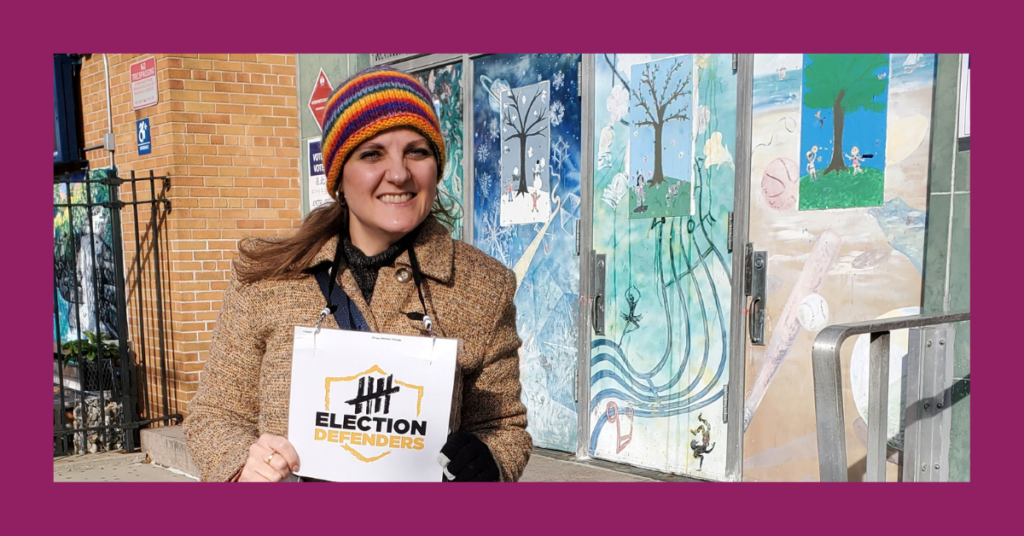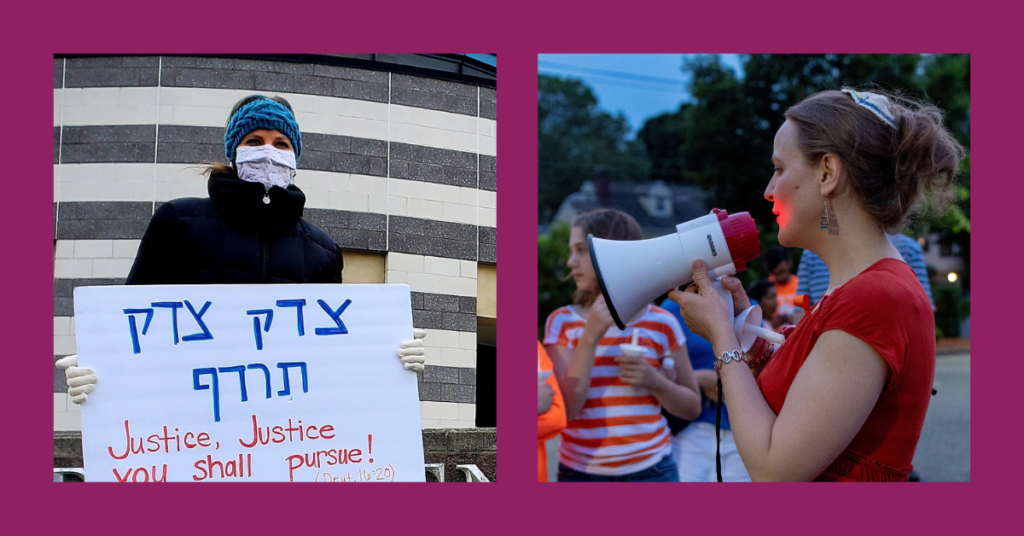
Rabbi Jennifer Schlosberg is the rabbi at the Glen Rock Jewish Center, right across the George Washington Bridge from New York City. Her synagogue community serves 200 member families and about an additional 75 nursery school families. T’ruah spoke with Rabbi Schlosberg in spring 2021. This interview has been edited for clarity.
T’ruah: What drew you to become a rabbi?
Rabbi Jennifer Schlosberg: I always thought I wanted to be an attorney, specifically a civil rights attorney. I did a summer in the Justice Department in Washington, D.C. I really thought that the only way to create change — real change — was through politics.
But before law school, I decided I was going to take a year and give back to the community. I fell into a fellowship with Hillel. This fellowship no longer exists, but I was a Jewish Campus Service Corps (JCSC) Fellow. Our goal was to speak with and engage young students on college campuses, specifically those who were unaffiliated or on the peripheries of Judaism.
So in that way I guess you could say my passion always was organizing in some way. And because of that work, I began to think about what unique individual spiritual impact we want to make on other people specifically. But more broadly, as we look at our own life, what imprint do I want to leave on this world, so that when I’m no longer in it, I have contributed something tremendous?
I said “I want to be a rabbi,” and they said, “We knew that all along. We were just waiting for you to find it out on your own.”
I first wrote to my college Jewish Studies professor and said, “I think this is what I want to do.” His support was great. And then I went home to talk to my parents. I was living in Ohio at the time, and they were in Pennsylvania. And I spoke to my parents, and their response was beautiful. I said “I want to be a rabbi,” and they said, “We knew that all along. We were just waiting for you to find it out on your own.” Which led me to believe that the spiritual soul seeking that I was doing was actually right on target. They somehow saw something in me that maybe I didn’t see as much.
So that’s sort of the spiritual reason I became a rabbi. I felt like it was this larger calling. It also happens to combine a lot of my passions. I love working with people of all ages. So I love playing with kids on the floor, all the way up to seniors. Supporting people during life cycle events, and moments, and rituals is a deeply rewarding and meaningful part of my work. I feel very honored and very humbled to be part of those intimate moments in people’s lives. The ups and downs. Their simchas, their sorrows. It creates a level of intimacy that’s really special. Because at the end of the day, I think it’s all about relationships and community building.
[She interrupts herself because she sees a tweet that a vaccination site in New Jersey has new appointments.] One of the things I’m doing now is I’m leading a team of people who are setting up vaccine appointments for other people. When we get an alert we have to just act on it right away, because if not, people don’t get vaccines. So this is my organizing, right here in action. [She laughs.]

T: Did you always make the connection—as a rabbi I can make an impact, I can be an organizer? Or was that something you came to realize later on?
JS: I was supported by a friend of mine who had a lot of faith in me to be a leader. At the time it was a political leader. I was interning in the offices of congresspeople, and getting involved that way. It was a friend who made me realize, and through my own soul searching a little bit, that there are multiple ways of creating change. When I think about my own recent change work and the state of New Jersey, it highlights the importance of how clergy can partner with politicians or elected officials or appointed officials to create that change. My instinct was to realize how important it was to motivate people, to have clergy motivate people, to be a rabbi who motivated people, to inspire people. That was where I realized oh, that has a lot of influence and power too. Not power in a negative sense, but power to create change for the better of society.
T: Right. At T’ruah we talk a lot about using your moral voice.
JS: It’s hard as a rabbi, don’t get me wrong. In my synagogue community, I’m not supposed to take political sides. And there are definitely positions that I feel are rooted in Jewish tradition, are part of my moral voice or my values-based narrative, and we can’t ignore that.
A rabbi mentor once said, “Think about what you say on the bimah, specifically regarding political sermons and things like that, or sermons that push the envelope a little bit with causes, social justice issues, where some people may be marginalized or disagree. Don’t do anything that you feel like you wouldn’t be willing to lose your job for.”
Look, if I can’t stand up on the bimah and say that we have to support refugees who are seeking asylum in the United States of America and who otherwise have no place to go, and to speak up against children being torn apart from their families who are seeking asylum, if I can’t do that and my doing that is wrong, yeah, I’m willing to lose my job for that.
Look, if I can’t stand up on the bimah and…speak up against children being torn apart from their families who are seeking asylum…yeah, I’m willing to lose my job for that.
I did a lot of work on gun advocacy in the state of NJ. And I partnered with JOIN for Justice, who taught me how to do a lot of community organizing. It was because of that work that we were able to get the governor and the attorney general of New Jersey to sign on to the Do Not Stand Idly By Campaign, which put pressure on gun manufacturers to sell to firearms shops that had strict standards for screening, among other things.
That was a group of religious figures, a group of clergy, making meetings with the governor and attorney general. And we didn’t hear back and didn’t hear back, but then really pushing to make those meetings happen, even using our personal connections and relationships, and then eventually it did happen.
And as a result of that, I feel like what I’ve done for my community is made them realize that, you know, people say “keep politics out of the synagogue.” I’m keeping politics out of the synagogue, but I’m keeping strongly Jewish issues in the synagogue. And if those strongly Jewish issues are rooted in legislation that’s happening in the world around us, advocacy efforts, opportunities for people to lobby Congress, if there’s an overlap with politics in that way, so be it. But it’s still rooted in our faith.
T: How did you first become involved with T’ruah?
JS: I think it’s an outstanding organization. I think they lead with their moral voices. A lot of the work that I do overlaps with a lot of the work that T’ruah does. There have been times when there have been complicated issues, where opposing viewpoints could both be potentially rooted in the Jewish tradition. I have often gone to see on T’ruah’s website: What does T’ruah have to say about this? Not to say that I blindly accept what T’ruah says, but the organization’s statements are influential in my own understanding of those issues. One example is force-feeding in detention centers. There are complicated issues at play about life, about freedom.

R: At a gun safety advocacy vigil (Photo: Dave Wreski).
T: You protested at the Bergen County Jail this past winter. Why was that an issue you wanted to take action on?
JS: I don’t remember how I first heard about the problems at Bergen County Jail. A colleague told me, hey we’re going to protest, do you want to come? Why did I want to get involved? It’s like up the road from me, it’s like 12 minutes away from my house! And the fact that this was happening was just an atrocity. The safety issues with these inmates in terms of covid protocols, and their not being criminals, but just stuck in the hopper waiting for a decision to be made but then all of a sudden, nothing. So it’s just horrible.
I think my role in a lot of these things is just to bring it to the surface for my community members.
Very recently, I got word on Facebook from a friend that in the school district in which I was raised, a member of their school board was posting hateful things about people who are transgender, and came out against the recent presidential appointee Rachel Levine who is transgender. She posted some unkind things about her. LGBT affiliates of my school district growing up were enraged. How can we have this member of the school board, a board member who is meant to be making decisions for the health and safety and wellbeing of our children outwardly say that people who are transgender are in some way less than?
I was just enraged. And I don’t live there. I don’t pay taxes there. I don’t go to school there. I don’t have a vote there. But this is the school district in which I was raised.
So I created this online petition at change.org, and I thought maybe I’d get 100 signatures. Overnight, it was 500. Before I knew it there were almost 5,000 signatures.
But I caused trouble. In my school district. I really did. And I helped bring awareness to the issue in my community.
My mother woke up the next morning and she texted me, and she said “Jennifer, I heard you were on television. What is going on?” And I explained to her and she’s like “Oh, good work!”
My mother woke up the next morning and she texted me, and she said “Jennifer, I heard you were on television. What is going on?” And I explained to her and she’s like “Oh, good work!”
I was getting phone calls from the press in Pennsylvania from my hometown, and also the Philadelphia networks covered it. The petition had 42,000 views and over 1,000 shares.
So when we talk about what role a rabbi can have, and what role clergy can have, it’s like I want to bring this to the surface. People know that when they see rabbi, it lends a little street cred to my statements.
And I debated, I really debated did I want to put “rabbi” on there or not. And I decided I wanted to because people would take me a little more seriously, maybe. And they did. I got so many thank yous.
T: I was interested to read that you are a talented baton twirler. It’s not a common hobby for a rabbi. Actually I think it’s not really a common hobby for anyone, but especially rabbis who are often thought of as sort of solemn—
JS: Solemn??
T: Of course, I know rabbis are exciting. My mother’s a rabbi, so I would never suggest rabbis are anything but fun, but I read in an interview you talked about fire twirling as a spiritual practice, and I just thought that was so cool. I’d love to hear about how you got started doing that and what does your community think about it?
JS: I think my community thinks that it’s pretty fun that their rabbi is a fire-twirling rabbi. I do things for Chanukah, I do things for Havdalah, like lighting up, with candles, and things like that. You know when I say it’s a spiritual practice, it’s a practice much like prayer. Prayer is sometimes an escape, sometimes a way to connect. So too is any sport, any artistic expression of the self. Such is baton twirling for me. Sometimes you grab it, sometimes you don’t. Sometimes it’s just fun!
T: Is there any particular Jewish text or verse that comes back to you again and again when you think about your work as an organizer or your Jewish values and how they play out in the real world?
JS: Btzelem Elohim. I mean I know it’s overused but just understanding that everyone’s created in the divine image. And knowing that we all don’t have the same resources, we all don’t have the same opportunities. Because of those differences, I feel it’s my obligation to recognize the other and to support them.
